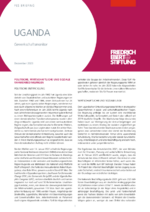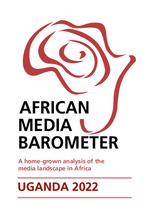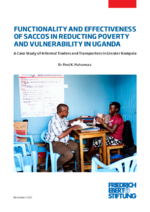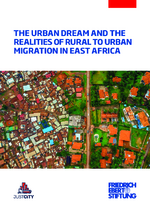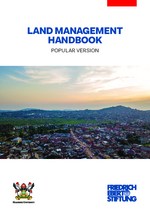Uganda
Although the multi-party system was formally reintroduced in Uganda in 2006 after decades of dictatorship and civil war, the country lacks independent actors and an enforceable legal framework. The aim of the government's political actions is not to achieve far-reaching democratisation, but to consolidate its own political dominance. The government's efforts to develop the country are limited by a lack of financial room for manoeuvre, inefficiency and corruption in the administration and high population growth. Successes do not benefit the wider population enough. The country's military strength in the region is also demonstrated by the deployment of troops in peace missions (Somalia) or to fight terrorist militias such as the ADF (Allied Democratic Forces) in the Democratic Republic of Congo, which directly threaten Uganda.
The semi-authoritarian regime carefully controls the available space for political and social actors and critical discourse. The government's interest in a socially just social order and political participation opportunities for large sections of the population is limited.
In this situation, the Friedrich-Ebert-Stiftung (FES), which has been active in the country since 1967 with longer interruptions during the years of dictatorship, is trying to facilitate a critical dialogue with its partners from civil society, government and parliament and to offer a platform for democratic forces and different positions. The focus is on systematically analysing the existing deficits and creating an awareness that alternative approaches, particularly in economic and social policy, are necessary and possible, but that these can only be realised in a participatory, democratic system. Work approaches in the area of labour market and social policy deal, among other things, with the challenges in the informal sector, the conditions for socially just urban development and the prerequisites for sustainable public transport. In addition, the FES is committed to strengthening trade unions, promoting young talents and the inclusion of women in politics, business and society.
Find out more about our work in Uganda on the country project website.
Publications
African media barometer
Windhoek, 2023
Download (PDF) (860 KB, PDF-File)
Muhumuza, Fred K.
Functionality and effectiveness of SACCOS in reducting poverty and vulnerability in Uganda
Kampala, 2022
Download (PDF) (1,4 MB PDF-File)
The urban dream and the realities of rural to urban migration in East Africa
Download (PDF) (10 MB, PDF-File)
